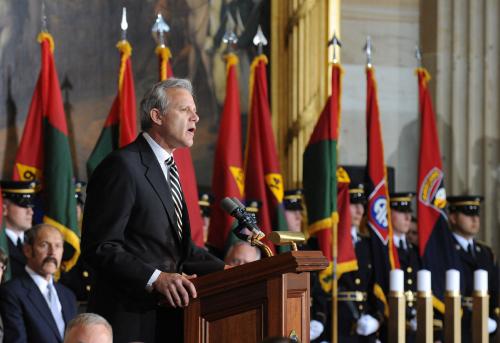A new inside account of Obama’s Israel ire
MORE FROM
JOHN PODHORETZ

When it’s released June 23, the new book by bestselling historian Michael Oren is going to be the talk of Washington and Jerusalem — not to mention everywhere people take an interest in the relations between the United States and Israel, which is to say, in many if not most places on the planet.
It’s called “Ally: My Journey Across the American-Israeli Divide,” and I’m not sure that in the annals of diplomatic history there’s ever been anything quite like this astonishing account of Oren’s four years (2009-2013) as Israel’s ambassador in Washington.
It’s an ultimate insider’s story told while all the players save Oren are still in place; the Israeli prime minister he served still holds office and the administration to which he was the ambassador will remain in power until January 2017.
It’s not that there’s lots of breaking news in “Ally” that will startle people. Rather, it makes news on almost every page with its incredibly detailed account of the root hostility of the Obama administration toward the Jewish state.
What makes the details especially credible is that Oren is no flame-breathing Israeli right-winger but very much (and at times distressingly) an Establishment creature and one, moreover, who makes it clear he drank the Obama hope-and-change Kool-Aid in 2008. (Indeed, he now serves in Israel’s Knesset not as a member of Bibi Netanyahu’s Likud but of the new centrist Kulanu party.)
On major matters, the administration seemed to hold Israel accountable for problems it had nothing to do with.
Example: The Palestinian Authority made moves toward seeking a declaration of statehood at the United Nations in 2011, which would’ve triggered a law shutting down their US mission and suspending all aid to the PA and to UN agencies that recognized Palestine.
In response, Deputy Secretary of State Tom Nides called Oren into his fancy Foggy Bottom office and screamed at him: “You don’t want the f - - - ing UN to collapse because of your f - - - ing conflict with the Palestinians, and you don’t want the f - - - ing Palestinian Authority to fall apart either.”
To which Oren replied that Israel didn’t want the United Nations to collapse, “but there are plenty of Tea Party types who would, and no shortage of Congress members who are wondering why they have to keep paying Palestinians who spit in the president’s eye.” He reports that Nides “slumped into his Louis XVth chair.”
Oren also writes about bizarrely petty offenses. In 2010, Obama left Israel off a list of countries he mentioned as having helped in the wake of the Haiti earthquake when it was the first nation in the world to dispatch relief teams and get them to the disaster sites — because the president was angry about something having to do with the peace process.
Even when the administration is acting friendly, Oren senses it is doing so not out of genuine fellow feeling but to keep Israel close — hugging it to prevent it from acting, especially when it came to Iran’s nuclear program.
Only when Israeli diplomats were at risk of being killed by rampaging Egyptians during the Arab Spring, and when Israel’s north was engulfed by forest fires, did Oren witness acts of unmitigated support from the Obamans. And note, in both cases, that they came when Israelis were powerless or ill-equipped to act on their own.
Throughout his tenure, Oren believed he was uniquely well-equipped to explain Israel to Americans and America to the Israelis. But how to explain a president who recently said that the Israel he admires is the Israel of kibbutzim and Golda Meir — a ludicrously rosy and unrealistic image of the Jewish state on par with wanting to look like Disneyland’s Main Street USA?
There was and is no good way to explain the views of the man in the White House on this matter except to use ones Oren never uses but implies throughout:
For ideological reasons, Obama doesn’t like the Israel that exists. Period.
How ObamaAbandoned IsraelOren: President took deliberate steps toundermine Israel-America relationship | ||
| 7:19 AM on Wednesday, June 17, 2015 - Sivan 30, 5775 | ||
Former ambassador to the United States Michael Oren writes that President Obama deliberately undermined the U.S.-Israel relationship from his first day in office, primarily by abandoning two central tenets.
From the moment he entered office, Mr. Obama promoted an agenda of championing the Palestinian cause and achieving a nuclear accord with Iran. Such policies would have put him at odds with any Israeli leader. But Mr. Obama posed an even more fundamental challenge by abandoning the two core principles of Israel’s alliance with America.The first was "no daylight" or the decision that governed Israel-U.S. relations for decades that no disagreements would go public. The U.S. and Israel always could disagree but never openly. Doing so would encourage common enemies and render Israel vulnerable.The other principle was "no surprises." Obama made numerous significant policy changes toward Israel without consulting the Jewish state. Mr. Obama delivered his Cairo speech, with its unprecedented support for the Palestinians and its recognition of Iran’s right to nuclear power, without consulting Israel. Similarly, in May 2011, the president altered 40 years of U.S. policy by endorsing the 1967 lines with land swaps—formerly the Palestinian position—as the basis for peace-making. If Mr. Netanyahu appeared to lecture the president the following day, it was because he had been assured by the White House, through me, that no such change would happen.Now, as the Middle East unravels, Oren concludes that the United States and Israel must restore these two key principles to remain strong allies. If not, Israel will lose its key benefactor and the U.S. will lose its only friend in the Middle East. | ||


No comments:
Post a Comment